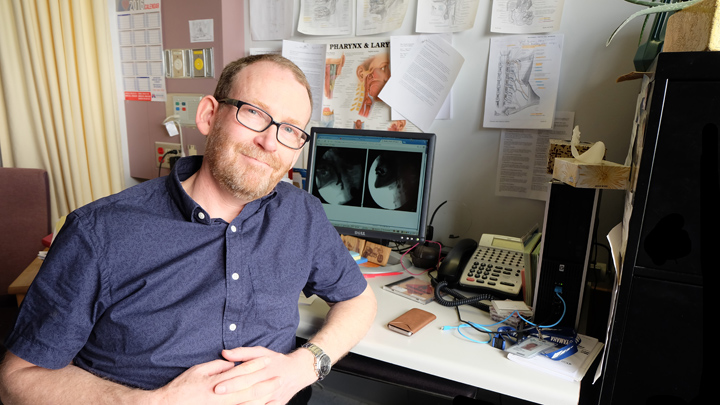
August 18, 2016

Speech-language pathologist Michael Burrows knows first-hand the difficulties his patients face.
Story by Sarah Megran; photo courtesy of Michael Burrows
Well into his adult life, Michael Burrows lived with a stutter. It wasn’t until Burrows sought help that he realized that the speech impediment he’d been so ashamed of was actually leading him to his future career.
Burrows, 50, is now a speech-language pathologist (slp) based out of the Two Hills Health Centre, where he helps his patients with communication and swallowing problems.
“The disorder is something you have, not something you are,” he says. “I love discovering the person behind the disorder.”
That journey of discovery is one Burrows knows well, as working to overcome his own speech impediment helped him find just who he was deep down inside.
“I transformed from a quiet, cynical guy who was good with computers to someone who loves to talk and teach,” he says.
Burrows is also all too familiar with the difficulties that his patients face with speech disorders, but that is also what makes him a perfect fit for the job. Speech-language pathologists assess and treat individuals who have problems with communication, be it in speech, language, social interaction, fluency, voice, or literacy.
They also work with those with feeding and swallowing problems which may be present from birth or have developed over time or as a result from an illness or injury.
Working with adults who have speech and language disorders in rural Alberta comes with challenges and opportunity says Burrows. Without a wide range of services and physicians in small towns, he subsequently wears many hats. One of those hats involves educating SLP students.
Burrows began working with University of Alberta SLP students in 2005, providing a place for them to complete their practicums while he could share both his passion and clinical knowledge.
And earlier this year, he was welcomed at the University to host a two-part seminar, joined by Debbie Hrudey, one of his patients.
Hrudey, 56, suffered a stroke back in 2012 that caused a condition called aphasia, characterized by either partial or total loss of the ability to communicate verbally or use written words. Aphasia creates difficulties with finding words, organizing those words into sentences and understanding what others say.
“I used to think I was a stroke victim, but from working with Michael, he has said that I am ‘a stroke survivor.’ And I am,” says Hrudey. “I am helping the students, just as the students are helping me.”
And that was the goal of the seminar.
“My primary intention was to take the skills we learn in the clinic room to the real world,” says Burrows.